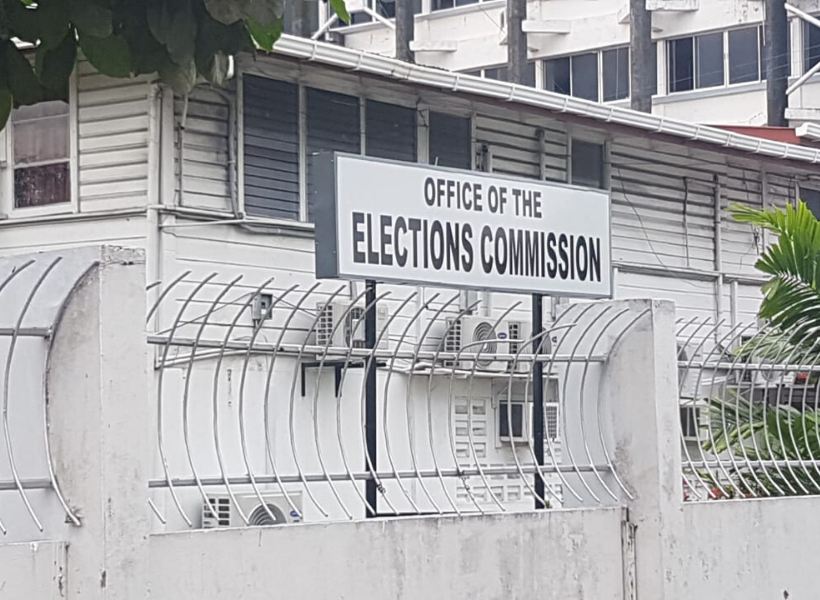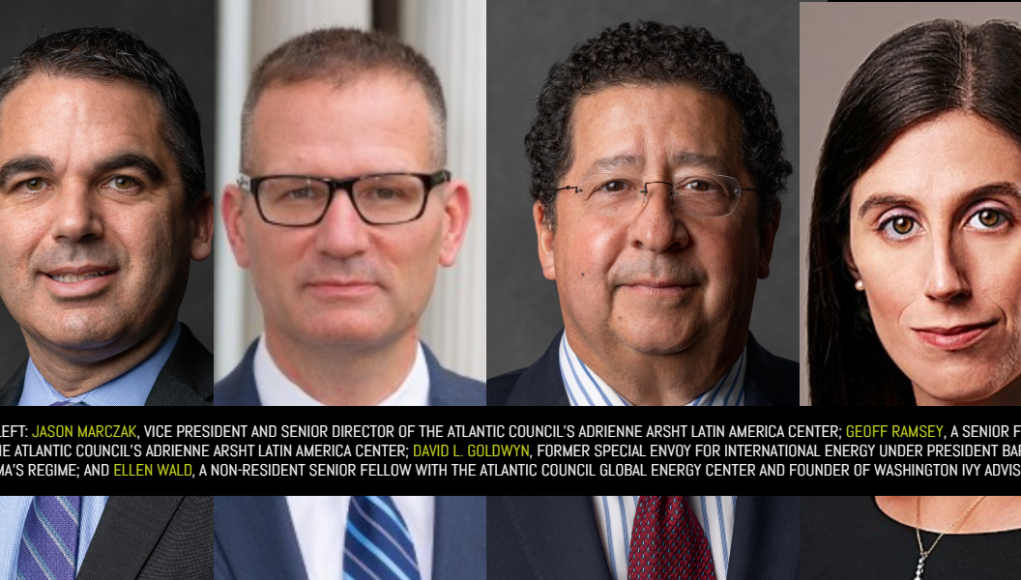By Sueann Wickham
Amidst the labyrinth of international diplomacy, a chorus of voices from American think tank—the Atlantic Council, has emerged to dissect the latest developments in Venezuela’s political landscape. From seasoned diplomats to energy experts, each brought a unique perspective to the table. At the heart of their discourse lies the recent announcement by the United States (US) to reimpose oil sanctions on Venezuela—a decision fraught with implications for both the nation’s political future and global energy markets.
The situation unfolded against the backdrop of a tumultuous journey towards democracy. In October 2023, hopes for a new regime were high as diplomats convened in Barbados, aiming to chart a course towards free and fair elections in Venezuela. It was agreed that to have the sanctions lowered, the Nicolas Maduro regime must hold a free and fair election in 2024 and there must also be a process for candidates to challenge their disqualification.
However, amidst the promise of progress, political tensions simmered beneath the surface. The government led by President Nicolás Maduro’s government, boldly suppressed opposition voices and subverted democratic norms. Out of fear of facing her at the polls, on Friday, Venezuela’s Supreme Court, which has remained oyal to President Nicolas Maduro’s government, upheld a 15-year ban on opposition leader Maria Corina Machado and also deemed her possible replacement, two-time presidential candidate Henrique Capriles ineligible.
American companies currently operating in the sanctioned land have been given until the end of May to apply to the US Treasury for an individual license to operate or wind down on their business with Venezuela, especially with its state-run oil company Petróleos de Venezuela S.A (PDVSA).
Jason Marczak, Vice President and Senior Director of the Atlantic Council’s Adrienne Arsht Latin America Center, emphasized the need for sanctions to benefit ordinary Venezuelans rather than elite interests.
“As the United States offers a new path for consideration of specific licenses to energy companies interested in operating in Venezuela, it will be essential to work to ensure that dollars from oil and gas transactions are circulated among everyday Venezuelans, not kept in the hands of the elite,” he noted.
While acknowledging Maduro’s unjust actions, Marczak underscored the importance of balancing democratic ideals with geopolitical realities. He suggests that the US must find a delicate balance between promoting democracy, addressing global energy concerns, and countering Russian and Chinese influence.
Geoff Ramsey, a senior fellow at the Atlantic Council’s Adrienne Arsht Latin America Center, views the US announcement as a compromise. He said that by reinstating sanctions while allowing space for Western energy companies to operate in Venezuela, the Biden administration aims to navigate the complex geopolitical landscape. Ramsey highlights the ongoing negotiations between opposition coalitions and the Maduro government, emphasizing the need for continued US engagement to incentivize lasting political agreements.
“The White House can loosen or tighten the sanctions regime moving forward, and can float diplomatic recognition and other incentives as carrots ahead of Venezuela’s election on July 28,” Ramsey clarified.
David L. Goldwyn, former Special Envoy for International Energy under President Barack Obama’s regime, delved into the diplomatic intricacies surrounding the US sanctions on Venezuela. Goldwyn highlighted the nuanced approach taken by the US Treasury Department, which offers specific license requests to serve US interests.
He said, “Venezuela has been punished for its abrogation of the Barbados agreement. But the US Treasury Department was clear that it welcomes, within the next forty-five days, requests for specific licenses that serve US interests.” He added that, “This leaves a bureaucratically cumbersome but clear path for companies to request the ability to swap Venezuelan crude for debt they are owed, for diluent or other products to relieve humanitarian distress in Venezuela, and under conditions similar to Chevron’s existing license, which minimizes the fiscal return on exports to PDVSA .”
He also emphasized the importance of swift responses to these requests and anticipated further diplomatic maneuvers ahead of Venezuela’s upcoming election.
“Much also depends on the ability of the US Treasury to respond to those license requests swiftly. But with this one move, the United States has avoided blame for interference in the Venezuelan elections, preserved diplomatic capital for a future day, and this time managed to punish the aggressor more than the victims,” he noted.
Goldwyn’s expertise draws from his extensive diplomatic experience. He also served Assistant Secretary of Energy for International Relations under President Bill Clinton, is chair of the Atlantic Council’s Energy Advisory Group and a Non-resident Senior Fellow with the Council’s Global Energy Center.
With the withdrawal of US sanctions waivers, China is poised to dominate Venezuela’s oil exports. This is according to Ellen Wald, a Non-Resident senior Fellow with the Atlantic Council Global Energy Center and Founder of Washington Ivy Advisors, who predicts a shift in Venezuela’s export destinations and potential negotiations for lower prices with China. “September 2023, the month before the Biden administration issued the waiver, Venezuela exported a total of 797,000 barrels per day (bpd) of crude oil, fuel oil, and methanol…. More than 50 percent of its petroleum went to China,” Wald stated.
While Venezuela’s revenue may decrease slightly, the impact on global oil prices should be minimal.
“Venezuela will probably continue to export at the 895,000 bpd level because China will probably purchase additional cargoes that other nations stop buying now that sanctions are back in place,” she added.
Wald’s analysis highlighted China’s increasing influence in global energy markets and its strategic interests in securing access to Venezuelan oil.
As Venezuela navigates the repercussions of the reimposed sanctions, the global community watches with a mix of apprehension and anticipation. The delicate dance between democracy promotion, economic stability, and geopolitical interests continues, shaping the future trajectory of Venezuelan politics and global energy markets.
It is also important to note that Maduro has recently violated other agreements including the December Argyle agreement with Guyana which served to de-escalate tensions amidst a blatant attempt by Maduro to annex the country’s Essequibo region. Although promising to not engage in any acts of aggression and maintain stability and peace in the region, Maduro recently used his Supreme Court to pass a law officially declaring the Essequibo region of Guyana to be a constituent part of that Spanish speaking nation.
The legislation imposes restrictions on individuals expressing support for Guyana’s position on the territorial dispute and mandates fines for the dissemination of maps depicting the disputed area as part of Guyana’s territory.
It must be noted that the government of Guyana does not recognize this illegal legislation and views it as a direct threat to Guyana’s sovereignty. In addition, the international community has issued strong condemnations against this law. Notable bodies include the Organization of American States (OAS) and the Caribbean Community (CARICOM).
The Guyana government said it stands firm on its decision to have the International Court of Justice lay the final judgment on the Guyana-Venezuela controversy.











